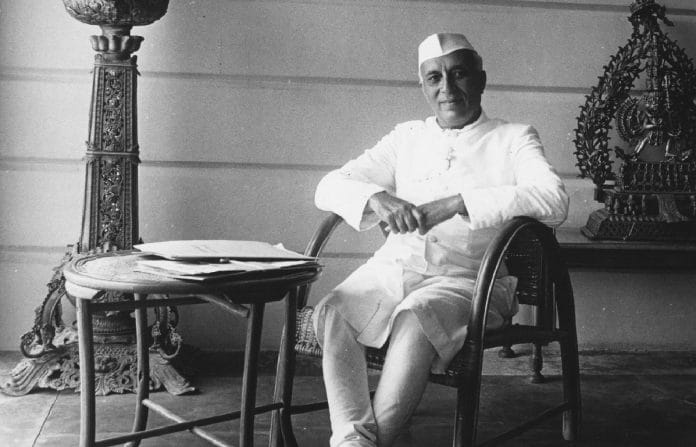On Jawaharlal Nehru’s 129th birth anniversary, ThePrint looks back at the life and times of the freedom fighter and India’s first Prime Minister.
New Delhi: Jawaharlal Nehru, India’s first Prime Minister and one of the most prominent freedom fighters, was a leader with a difference.
Nehru led India for 17 years after Independence and left a deep impact on the country and its people. From his economic policies to the idea of secularism, policy of non-alignment to relations with China, many of his decisions continue to influence 21st Century India.
On Nehru’s 129th birth anniversary, ThePrint looks back at the life and times of the man who shaped the future of the young republic unlike anyone else.
Early life
Nehru was born to a family of Kashmiri Brahmins in Allahabad on 14 November, 1889. His father Motilal Nehru was a renowned lawyer and leader of the Indian independence movement.
Nehru received much of his early education from private tutors. He left for England at the young age of 15 and got enrolled at Harrow, a leading English school. He completed his graduation in natural sciences from Trinity College at Cambridge. He also qualified as a barrister after spending two years at the Inner Temple at London.
After spending seven years in England, he returned to India in 1912. In 1916, he married Kamala Kaul and had only one child — Indira Priyadarshini, who later went on to become India’s first woman prime minister.
Also read: Jawaharlal Nehru’s precious legacy is being undermined daily, says Sonia Gandhi
Entry into politics
After his return to India, Nehru initially tried to settle down as a lawyer but didn’t relish the practice of law and company of lawyers. Like several others from his generation, Nehru yearned for India’s independence but did not have any clear idea on how to achieve it. The massacre at Jallianwala Bagh in April 1919 strengthened Nehru’s resolve to win India’s independence.
He joined the Indian National Congress in 1919 and was greatly influenced by Mahatma Gandhi.
In 1920, Nehru went behind the bars for the first time during the Non-Cooperation Movement led by Mahatma Gandhi. He went to jail several times and spent almost nine years in jail before India got independence.
In 1929, Nehru was elected as president of the Indian National Congress. While presiding the Lahore session of the Congress, Nehru demanded Poorna Swaraj or complete Independence, as opposed to a dominion status.
After Britain announced India’s participation, Congress passed the Quit India Resolution on 8 August, 1942, in which, Nehru demanded political freedom from Britain in exchange for support in the war. The following day, several Congress leaders, including Nehru, were arrested.
Post-Independence
On 15 August, 1947, Nehru became independent India’s first Prime Minister and served for almost 17 years.
He advocated democratic socialism and secularism, and encouraged the industrialisation of India which began with the five-year plan in 1951. He also promoted scientific and technological advancements.
Nehru received the Bharat Ratna on 15 July, 1955, by then President Rajendra Prasad.
Kashmir accession
In the early months after partition, a war broke out between India and Pakistan after the latter sought to secure Kashmir by force. After Pakistan launched a tribal militia to attack Kashmir, the princely state sought help from Nehru to battle Pakistan. India helped Kashmir after the Instrument of Accession was signed by Maharaja Hari Singh on 26 October, 1947.
Ultimately, the United Nations brokered a ceasefire line in the region and Nehru proposed territorial adjustments which failed.
The Kashmir dispute is yet to be resolved between the two countries.
Non-Aligned movement
During the Cold War, Nehru developed a policy of ‘positive neutrality’ in order to keep India away from the major superpowers — the US and USSR.
In 1961, Nehru helped in the establishment of the Non-Aligned Movement which held its first conference at Belgrade.
Also read: Nehru’s words to UN in 1948 still ring true: ‘Forget politics, focus on economic troubles’
Sino-India war
In 1954, Nehru signed the Five Principles of Peaceful Coexistence or Panchsheel treaty with his Chinese counterpart Zhou Enlai. He also promoted the slogan of “Hindi-Chini bhai-bhai” to foster a spirit of brotherhood among the peoples.
However, the treaty didn’t hold and the border skirmishes between the two countries transpired into war in 1962, in which Indian forces were decisively beaten. Following the war, Nehru’s health significantly deteriorated.
He died of a heart attack in New Delhi on 27 May, 1964.







they made them larger than life because it was only possibility for these traitors’s for their survival
There is no such thing as congress party , only traitors in disguise of CONGRESS ! congress party naturally got dissolved long time back with advent of freedom on 15th august 1947. since then only traitors have disguised themselves as CONGRESS and have been successfull in deceiving people , BUT NO MORE WITH ARRIVAL OF LION MODI!
Reply